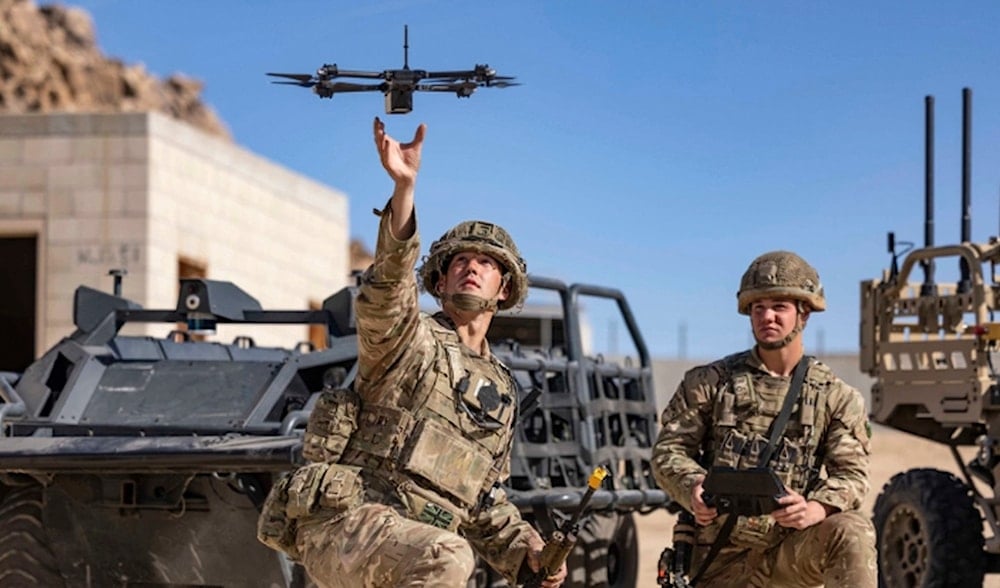UK gov partner company developing AI technology for drones: Guardian
Faculty AI, a company that has closely worked with the UK government, has been working on developing AI-controlled drones.
-

In this photo from the Defense Visual Information Distribution Service, British soldiers launch a drone during Project Convergence exercises at Fort Irwin, California, on November 4, 2022. (AP)
The Guardian reported on Tuesday that Faculty AI, a company closely partnered with the UK government on artificial intelligence safety, the NHS, and education, is also specialized in developing AI technology in the military industry.
The UK-based consultancy is actively involved in developing AI applications, including military drones, as noted by a defense industry partner. The company specializes in deploying AI on unmanned aerial vehicles (UAVs) and has become a prominent provider of AI services in the UK.
This comes as weapons companies are exploring the use of AI on drones for various applications, including "loyal wingmen" to accompany fighter jets and loitering munitions that can wait for targets before striking, with advanced technologies raising the possibility of drones operating without human oversight in lethal decision-making.
In this context, it is noteworthy that Faculty AI has partnered with British startup Hadean on projects such as subject identification, object tracking, and autonomous swarm development. While the collaboration with Hadean reportedly did not involve weapons targeting, the company declined to clarify whether it is working on drones capable of lethal force, citing confidentiality agreements.
Faculty AI stated that its focus is on developing AI models for safer and more robust defense solutions, adhering to rigorous ethical policies and Ministry of Defence AI guidelines.
A conflict of interest
Faculty's close collaboration with the UK’s AI Safety Institute (AISI) positions it as an influential voice in shaping government policy. In November, Faculty was contracted by AISI to study how large language models might facilitate criminal behavior, further cementing its role as a strategic partner. Faculty also works with OpenAI and tested its GPT-4.0 model before its release, though concerns have been raised about potential conflicts of interest in its dual roles as tester and consultant.
While the government has stated that Faculty AI is not conflicted by developing its models, critics, including Green Party peer Natalie Bennett, have expressed worries about the overlap between Faculty’s roles, describing it as akin to being both poacher and gamekeeper.
Bennett also criticized the UK government’s lack of commitment to ensuring human oversight in autonomous weapons systems, as recommended by the Lords committee. Faculty has cultivated extensive ties within the UK government, securing contracts worth at least £26.6 million across departments like the NHS, education, and culture. These contracts constitute a significant portion of its £32 million revenue for the year ending March 2023, despite a £4.4 million loss.
Experts, such as Professor Albert Sanchez-Graells, warn that the UK relies heavily on tech companies’ self-regulation in AI development. He emphasized the need for companies like Faculty, with broad AI portfolios, to ensure their advice to AISI remains independent and does not create conflicts of interest or unfair advantages in other business ventures.
More on the UK's drone partnerships
In a related context, the Ministry of Defense recently revealed that the UK plans to ditch a fleet of 47 unmanned Watchkeeper drones produced by Elbit Systems next year. The drone program is typically built at UAV Tactical Systems, an Elbit facility located in Leicester, a city in England's Midlands.
The Watchkeeper design is based on Elbit’s Hermes 450 drone, which has been marketed as combat-proven through its use against Palestinians.
While the Defense Ministry claimed the Watchkeeper drones were being scrapped for "aging", the initial military plan stated that the fleet would actually sustain the British military for two decades, until 2042.
It is worth noting that Elbit Systems is known for supplying the Israeli occupation forces with drones, munitions, combat vehicles, missiles, and various other types of weaponry. According to the British newspaper Morning Star, "The majority of their arms are marketed as 'battle-tested,' meaning they have been deployed in bombardments against the Palestinian people."
Read more: UK's Palestine Action forces closure of Israeli Elbit Systems factory

 4 Min Read
4 Min Read








